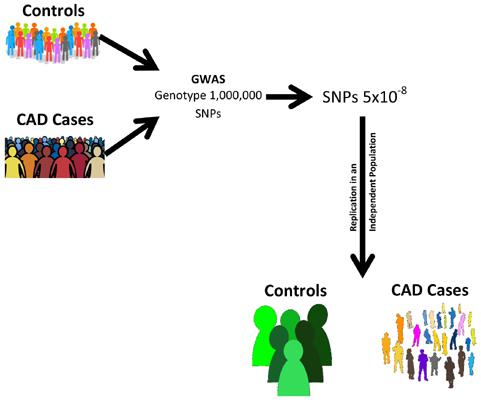当前位置:
X-MOL 学术
›
Curr. Genomics
›
论文详情
Our official English website, www.x-mol.net, welcomes your
feedback! (Note: you will need to create a separate account there.)
A Journey through the Genetic Architecture and Predisposition of Coronary Artery Disease
Current Genomics ( IF 1.8 ) Pub Date : 2020-09-04 , DOI: 10.2174/1389202921999200630145241 Robert Roberts 1 , Chih Chao Chang 1
Current Genomics ( IF 1.8 ) Pub Date : 2020-09-04 , DOI: 10.2174/1389202921999200630145241 Robert Roberts 1 , Chih Chao Chang 1
Affiliation

|
Introduction
To halt the spread of coronary artery disease (CAD), the number one killer in the world, requires primary prevention. Fifty percent of all Americans are expected to experience a cardiac event; the challenge is identifying those at risk. 40 to 60% of predisposition to CAD is genetic. The first genetic risk variant, 9p21, was discovered in 2007. Genome-Wide Association Studies has since discovered hundreds of genetic risk variants. The genetic burden for CAD can be expressed as a single number, Genetic Risk Score (GRS). Assessment of GRS to risk stratify for CAD was superior to conventional risk factors in several large clinical trials assessing statin therapy, and more recently in a population of nearly 500,000 (UK Biobank). Studies were performed based on prospective genetic risk stratification for CAD. These studies showed that a favorable lifestyle was associated with a 46% reduction in cardiac events and programmed exercise, a 50% reduction in cardiac events. Genetic risk score is superior to conventional risk factors, and is markedly attenuated by lifestyle changes and drug therapy. Genetic risk can be determined at birth or any time thereafter. Conclusion
Utilizing the GRS to risk stratify young, asymptomatic individuals could provide a paradigm shift in the primary prevention of CAD and significantly halt its spread.
中文翻译:

冠状动脉疾病的遗传结构和易感性之旅
简介 为了阻止冠状动脉疾病 (CAD) 的传播,冠状动脉疾病是世界头号杀手,需要进行一级预防。预计 50% 的美国人会经历心脏事件;挑战在于识别那些处于危险中的人。40% 到 60% 的 CAD 易感性是遗传性的。第一个遗传风险变异体 9p21 于 2007 年被发现。全基因组关联研究已经发现了数百种遗传风险变异体。CAD 的遗传负担可以表示为一个数字,即遗传风险评分 (GRS)。在评估他汀类药物治疗的几项大型临床试验中,以及最近在近 500,000 人(英国生物银行)的人群中,对 GRS 对 CAD 风险分层的评估优于传统风险因素。研究是根据 CAD 的前瞻性遗传风险分层进行的。这些研究表明,良好的生活方式与心脏事件减少 46% 和有计划的锻炼相关,心脏事件减少 50%。遗传风险评分优于传统风险因素,并因生活方式改变和药物治疗而显着减弱。遗传风险可以在出生时或之后的任何时间确定。结论 利用 GRS 对年轻、无症状的个体进行风险分层可以为 CAD 的一级预防提供范式转变,并显着阻止其传播。
更新日期:2020-09-04
中文翻译:

冠状动脉疾病的遗传结构和易感性之旅
简介 为了阻止冠状动脉疾病 (CAD) 的传播,冠状动脉疾病是世界头号杀手,需要进行一级预防。预计 50% 的美国人会经历心脏事件;挑战在于识别那些处于危险中的人。40% 到 60% 的 CAD 易感性是遗传性的。第一个遗传风险变异体 9p21 于 2007 年被发现。全基因组关联研究已经发现了数百种遗传风险变异体。CAD 的遗传负担可以表示为一个数字,即遗传风险评分 (GRS)。在评估他汀类药物治疗的几项大型临床试验中,以及最近在近 500,000 人(英国生物银行)的人群中,对 GRS 对 CAD 风险分层的评估优于传统风险因素。研究是根据 CAD 的前瞻性遗传风险分层进行的。这些研究表明,良好的生活方式与心脏事件减少 46% 和有计划的锻炼相关,心脏事件减少 50%。遗传风险评分优于传统风险因素,并因生活方式改变和药物治疗而显着减弱。遗传风险可以在出生时或之后的任何时间确定。结论 利用 GRS 对年轻、无症状的个体进行风险分层可以为 CAD 的一级预防提供范式转变,并显着阻止其传播。











































 京公网安备 11010802027423号
京公网安备 11010802027423号